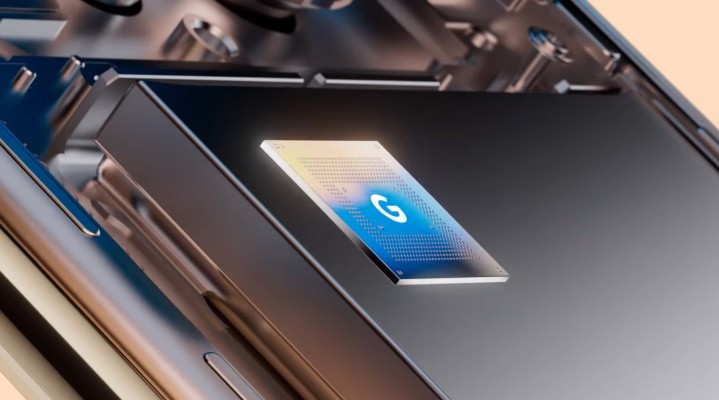I’m not sure there’s ever been a phone we knew more about before its official launch than Google’s Pixel 6 and Pixel 6 Pro. But in a world of samey Android phones, Google made some interesting choices, especially with regards to the chips that power it all. For the first time, Google now offers a phone that is powered by an SoC of its own design.
Dubbed Tensor, Google first talked about it earlier this summer. It’s what powers all of the on-device AI smarts of the phone. It’s basically Google’s own AI/ML accelerator, coupled with relatively off-the-shelf Arm CPU and GPU cores, as well as Google’s new Titan 2 security core.
Image Credits: Google
Google promises that Tensor will offer up to 80% faster performance than the chips that powered the Pixel 5, which, to be fair, was more of a mid-range phone but still feels perfectly smooth in everyday use. Leaked benchmarks ahead of today’s launch put it on par with modern Snapdragon mobile chips from Qualcomm — but those don’t include Google’s own AI/ML cores, and the role these specialized cores play in making the Pixel 6 cameras and their complex computational photography feel snappy can’t really be captured in a standard benchmark.
What we do know from these early leaks, though, is that Tensor is powered by two Arm Cortex-X1 chips, Arm’s flagship performance-oriented mobile designs. In comparison, the Snapdragon 888 only features one of those. As usual in modern SoCs, there are also some lower-performance, battery-saving cores. Rumor has it, these are a mix of older A76-based cores and the more recent ultra-efficient A55 ones (all of which help to get the Pixel 6 to a promised 24-hour battery life). Google itself has remained perfectly quiet about those details, which makes sense, given that the company wants to put the full focus on the system’s AI capabilities.
The chip also features a low-power AI “Context Hub” that powers some of the always-on machine-learning features on the phone.
And indeed, throughout today’s announcement, Google’s Rick Osterloh stressed these AI experiences, ranging from live translations to the phone’s photo and video capabilities.
“With Google Tensor, we’re unlocking amazing new experiences that require state of the art ML — including Motion Mode, Face Unblur, Speech enhancement mode for videos and applying HDRnet to videos,” Google’s senior director for Google Silicon, Monika Gupta, writes in today’s announcement. “Google Tensor allows us to push the limits of helpfulness in a smartphone, taking it from a one-size-fits-all piece of hardware into a device that’s intelligent enough to respect and accommodate the different ways we use our phones.”
In today’s event, she also noted that the chip has been in the works for the last few years. She noted that all of the design choices the team made were based on making those AI features work best.


